2 April 2012 Edition
Cardiac health deserves whole-hearted support
Between the Posts

Medics rush to the aid of Bolton FC’s Fabrice Muamba after he collapsed during an English Premier League match
At least 70 people between 14 and 40 years of age die every year in Ireland from Sudden Cardiac Death – there is hardly a county in Ireland unaffected by such tragedy
THE RISK of fatality for sportspeople is something that needs to be talked about. That’s especially the case when it comes to our young.
The recent collapse of Bolton FC’s 23-year-old Fabrice Muamba during a televised English Premier League soccer match has helped to raise public awareness of this issue. Thankfully for the player who collapsed with a heart condition, he received immediate medical attention. That undoubtedly aided his recovery.
The sensational commentary that has followed in the media has been predictable enough. More significant was the reaction of players at the scene. There was evident disbelief and panic at what had befallen their team-mate. Some of those on the pitch knew instinctively to signal for medical assistance that was, thankfully, very close by. Others were emotionally stricken as they witnessed Fabrice Muamba lying prostrate on the grass, his feet barely twitching.
Fortunately, most of us have never been in that position. Of course, risk of injury in sport is an unavoidable, occupational hazard. Some pre-match team-talks even exhort risk of injury for the sake of success : “Put your head where you wouldn’t normally put your hand if you want to win this match,” it’s said.
On more than one occasion, that’s exactly what I did. The first time I was floored was on a beautiful summer’s day at the Loup in south Derry. In the middle of an under-12 football blitz, an accidental collision of heads left me unconscious, with mild concussion. Assistance from the sideline was well-intentioned but rudimentary. I remember feeling a prickly sensation as I was slapped on the face by a mentor. Noise around me was audible but muffled. After a period which felt like minutes but was only a few seconds, I awoke on my back to see a couple of friendly faces kneeling over me. More than once in later years, it would be a blow to the face from an opponent’s hurling stick which would bring me back to earth with a bang. But in all the years I’ve enjoyed actively competing in sport, cardiac screening was never discussed.
I know at first-hand of one young player who suffered severe chest pain during a match. In his home county of Tyrone, Gaelic football dominates, so his talent and love for hurling is worthy of special note. As the chest-pain persisted, he was called to the sideline. Later, his parents arranged for him to go to hospital. He was suspended from sport whilst medical specialists carried out a series of scans and tests on his heart. After several months, he was given the all-clear.
Another young Tyrone player was not so fortunate. Cormac McAnallen was asleep when he died as a result of his heart condition in March 2004. His tragedy has raised awareness of the risk of fatality for our young sportspeople.
By all accounts, Cormac was an exemplary Gael. With a love for the Irish language and culture, he made his name whilst still a youth playing inter-county football for Tyrone. Some of this was captured in a compelling documentary about his life broadcast by TG4. Interviews with team-mates and friends alike testified to his popularity. What no one knew, not even Cormac McAnallen himself, was that his obvious strength of character belied a hidden weakness in his heart. Since then, more has become known about cardiac risk to young men and women.
Two years ago, Rhona Torney was part of the Antrim camogie team that won the All-Ireland title. That was despite concerns about her heart condition, Long QT Syndrome, which had been the underlying cause of Cormac’s death. Others have not been so fortunate. John McCall collapsed while playing for Ireland in the Under-19 World Cup. These fatalities are defined as Sudden Cardiac Death (SCD) and there is hardly a county in Ireland unaffected by such tragedy.
At least 70 people between 14 and 40 years of age die every year in Ireland from this condition. Every week in Britain, 12 apparently fit and healthy young people under the age of 35 die from undiagnosed cardiac conditions, according to Cardiac Risk in the Young (http://www.c-r-y.org.uk) – 80% of these deaths show no prior symptoms
The risk is not limited to elite athletes involved in sport. But sport can increase risk if the person has an unknown, underlying heart condition.
The Cormac Trust (www.thecormactrust.com), set up by the McAnallen family, have been raising awareness through many schools and sports clubs. Through their campaigning, they have helped to provide AEDs (Automated External Defibrillators) throughout Tyrone.
Much more can be done to save young lives. In Italy, where screening is mandatory for all young people engaged in organised sport, they have reduced the incidence of young sudden cardiac death by 90%.
A network of grassroots campaigners, bereaved families and support groups already exists in Ireland. Now we need a national strategy.




